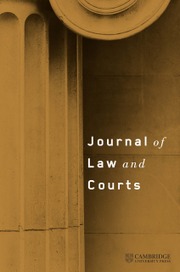Article contents
Judicial Review in a Defective Democracy: Judicial Nominations and Judicial Review in Constitutional Courts
Published online by Cambridge University Press: 21 October 2022
Abstract
Governments reform the process of nominating judges to constitutional courts, seeking to reduce the courts’ involvement in state affairs. Since 2008, reformers have tried to appoint judges who would be more judicially restrained. We examine the rulings of judges on Israel’s Supreme Court in its capacity as Israel’s High Court of Justice on the Israeli executive’s decisions. We show that reformers did achieve their goal of reducing High Court of Justice judges’ decisions supporting petitions against the executive. However, that trend has abated due to existing legal conventions regarding particular policy subsystems.
- Type
- Articles
- Information
- Copyright
- © 2021 by the Law and Courts Organized Section of the American Political Science Association. All rights reserved.
Footnotes
The authors wish to thank the Academic College of Tel Aviv-Yafo, Haifa University’s law faculty, and the Interdisciplinary Center’s Lauder School of Government for funding this project. We also thank Guy Freidman, Shai Talmor, and Yishai Barak for superb research assistance. We thank Yoav Dotan for sharing with us his data set on High Court of Justice petitions. Many helped us in organizing this project in theory, design, and analysis. We are most indebted to Yoav Dotan, Asif Efrat, Jonathan Krasno, Jay Krehbiel, Yaniv Roznai, and Adam Shinar. We are grateful to the editor of the Journal of Law and Courts and four anonymous reviewers who have made an immense contribution to this article’s final version.
References
- 4
- Cited by


